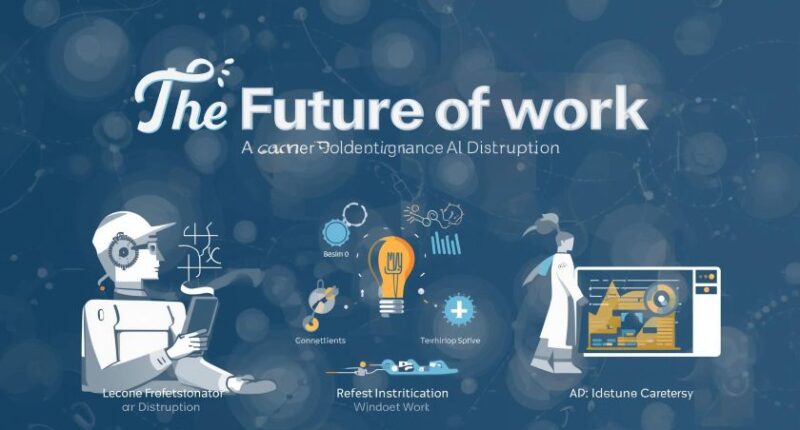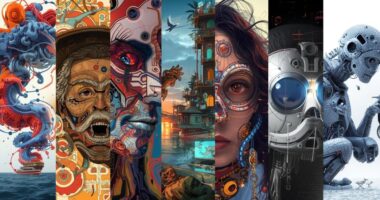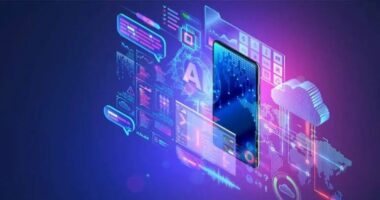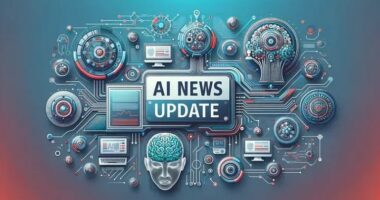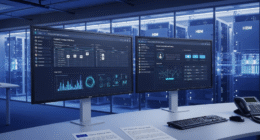Artificial Intelligence (AI) is reshaping the global workforce at an unprecedented pace. From automation and machine learning to generative AI tools, the modern workplace is undergoing massive transformation. While many fear AI could replace millions of jobs, it also presents new opportunities for those willing to adapt and innovate.
This article explores how to build a career that thrives beyond AI disruption, which industries are changing fastest, and the essential skills that will keep professionals relevant in 2026 and beyond.
Understanding AI Disruption in the Workplace
What Does AI Disruption Mean?
AI disruption refers to the large-scale transformation of industries caused by the adoption of AI-driven systems. These technologies automate repetitive tasks, enhance decision-making, and even generate creative content — all of which impact traditional jobs.
For instance, chatbots handle customer service, algorithms write reports, and robots perform surgeries with precision. While efficiency improves, workers must now rethink their roles and learn how to collaborate with intelligent systems instead of competing against them.
Jobs Most Affected by AI
According to recent studies, jobs involving repetitive, predictable tasks are at the highest risk of automation. Examples include:
- Data entry and administrative work
- Basic accounting and financial analysis
- Manufacturing and logistics operations
- Routine customer support
However, roles requiring emotional intelligence, creativity, and critical thinking — such as marketing strategists, educators, and healthcare professionals — remain less vulnerable.
How AI Is Creating New Career Opportunities
While some roles disappear, AI also creates entirely new professions. The demand for AI specialists, data scientists, ethical technologists, and automation managers continues to grow rapidly.
1. AI System Trainers and Prompt Engineers
AI systems require human training to improve accuracy and reduce bias. Prompt engineers, for instance, fine-tune AI models to generate more reliable outputs — a highly in-demand role in 2025 and beyond.
2. Data Analysts and AI Auditors
As organizations depend on data-driven insights, professionals who can interpret data and evaluate AI’s fairness, transparency, and ethical use will be essential.
3. AI Integration Specialists
These experts ensure that companies adopt AI smoothly without disrupting business operations. They act as bridges between technical teams and business leaders.
4. Digital Transformation Consultants
Businesses need strategic advisors who can help them transition into the AI era responsibly. Consultants with both tech and business acumen are increasingly sought after.
Essential Skills to Future-Proof Your Career
To outlast AI disruption, professionals must focus on skills that machines cannot easily replicate. Here are the most crucial abilities to cultivate:
1. Critical Thinking and Problem-Solving
AI can analyze data but lacks human judgment. The ability to evaluate complex scenarios, make ethical decisions, and solve unexpected challenges remains a uniquely human strength.
2. Creativity and Innovation
Automation frees up time for innovation. Workers who can design, invent, and think outside the box will lead the next generation of AI-powered industries.
3. Emotional Intelligence (EQ)
Empathy, communication, and leadership are irreplaceable human traits. As AI becomes more prevalent, organizations will value leaders who can manage teams and nurture relationships.
4. Tech Literacy and Adaptability
You don’t need to be a programmer to work alongside AI, but understanding its basics is crucial. Learn how AI tools function, their limitations, and how to integrate them into your workflow.
5. Lifelong Learning
Continuous education is the key to staying relevant. Online platforms like Coursera, edX, and Udemy offer courses in AI, data science, and digital marketing — all vital for long-term career growth.
Industries That Will Thrive in the AI Era
1. Healthcare and Biotechnology
AI enhances diagnostics, drug discovery, and patient care. Professionals with backgrounds in medicine, bioinformatics, or data analytics can find rewarding opportunities here.
2. Education and Training
As AI personalizes learning experiences, educators who can design tech-integrated curriculums and teach digital literacy will be in high demand.
3. Cybersecurity and Data Privacy
With more AI systems online, cybersecurity threats increase. Experts who safeguard data and build resilient systems will be crucial.
4. Green Technology and Energy
AI helps optimize renewable energy systems and monitor environmental changes. Sustainability-focused careers combined with AI skills will become essential for future growth.
5. Creative Industries
Writers, designers, filmmakers, and musicians using AI tools are redefining creativity. Those who embrace AI as a collaborator, not a competitor, will stay ahead of the curve.
Building an AI-Resilient Career Strategy
Step 1: Assess Your Current Skills
Start by identifying which of your skills are at risk of automation and which ones can complement AI. If your role involves repetitive work, learn how to integrate automation instead of resisting it.
Step 2: Upskill and Reskill
Take advantage of free or low-cost online AI and tech courses. Even learning to use AI tools like ChatGPT, Midjourney, or Microsoft Copilot can boost your productivity and career longevity.
Step 3: Embrace Collaboration with AI
Learn how to use AI as a partner rather than viewing it as a threat. Use AI tools for brainstorming, data analysis, and content generation to enhance your efficiency.
Step 4: Focus on Human-Centered Roles
Careers in leadership, psychology, design, and strategic management emphasize empathy and creativity — areas where humans will always excel over machines.
Step 5: Build a Personal Brand Around Adaptability
Employers value professionals who adapt quickly. Use LinkedIn, personal blogs, or digital portfolios to showcase your AI projects, ideas, and thought leadership.
The Human Advantage: Why AI Can’t Replace Everyone
AI may be powerful, but it lacks the depth of human intuition and ethics. It doesn’t understand cultural nuances, emotional context, or moral consequences. The future workplace will need human oversight to guide AI systems responsibly.
In fact, most experts agree that the AI-driven future will be human + AI, not human vs. AI. Those who learn to combine their creativity with AI’s analytical power will dominate future industries.
Conclusion
The AI revolution is not about replacing humans—it’s about transforming how we work. The real challenge lies in adapting our skills, mindsets, and career paths to thrive alongside intelligent machines.
By focusing on creativity, emotional intelligence, problem-solving, and lifelong learning, anyone can build a career that not only survives but flourishes beyond AI disruption.
The future of work is already here. The question is — are you ready to evolve with it?
